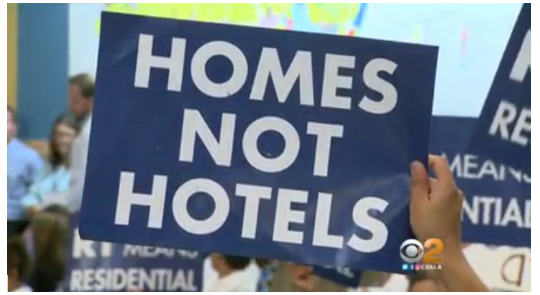CommentsSHORT-TERM RENTAL POLITICS--For three years, city officials have been designing an ordinance to address the unregulated home-sharing economy, made popular by sites like Airbnb. Soon, they will vote on it, and if passed, it will go into effect as early as July.
It’s about time.
The short-term rental industry has been a disease to the city, making this ordinance long overdue. Through mass conversion of residential units into tourist accommodations for travelers, landlords have effectively removed thousands of housing units from the rental market at a time when preservation of our housing stock is dire.
The key driver of Airbnb’s success has been a phenomenon colloquially referred to as “the de facto hotel”, where landlords convert full apartment complexes into full-serviced, hotel-style accommodations for higher-paying travelers to book through Airbnb.
Presently, there are 39,672 units listed on Airbnb in Los Angeles, and 60.8% of these listings (24,125) are for entire units—-units that are not used as a primary residence. While the exact number of de facto hotels is unknown, 50% of the hosts on Airbnb have multiple listings, which is evidence to suggest that the typical home-sharer isn’t a neighbor trying to supplement their income by listing a spare bedroom, but rather an individual or a leasing company looking to turn a profit on their real estate.
If the home-sharing ordinance passes—which I’m certain it will—hosts will be prohibited from listing multiple units on Airbnb. Provisions in the ordinance will limit hosts to renting only their primary home, cap the number of days per year they can rent to 120, and require they register for a license with the city.
While these are crucial steps in the right direction, a little-known, insidious extended-stay hotel business model sidesteps these regulations entirely.
The same vagueness in the city’s planning code that paved the way for Airbnb has spawned the extended-stay hotel. Extended-stay hotels are not homes and are not hotels. Simply, they’re ordinary apartment buildings, but occupants are not permanent residents. They have no fixed leases and can check-in and out whenever they wish, much like travelers. The catch? There is a strict minimum 30-day stay policy making it outside the parameters of the home-sharing ordinance which only regulates transient occupancy, defined by city municipal code as stays of less than 30 consecutive days.
Extended-stay hotels are not defined under city code, making them essentially legal. Because of the strict 30-day minimum stay policy, their occupants are, by default, considered residents.
There was always a legal case against sites like Airbnb because they enabled transient occupancy, something accommodated by hotels, in residentially-zoned buildings reserved for residents. The same legal case does not exist for the extended-stay hotel, because it doesn’t violate this clause. While the extended-stay hotel markets to travelers and transients of sorts, because reservations follow a strict minimum 30-day stay policy it doesn’t violate zoning code.
In this scenario, the freelancer working in Los Angeles remotely for three months is as much of a resident as the person who lives, works, and raises a family in Los Angeles. The two are obviously not the same, but the city planning code does not make a distinction.
If this remains the case, and it will until city officials address it, landlords and leasing companies can simply change their business model from short-term rentals to extended-stays, sidestepping the home-sharing ordinance.
One leasing company, CGI strategies, has already rolled out this business model. The Villa Carlotta, a 50-unit historical apartment building in Hollywood, opened for business last summer as an extended-stay residential hotel with a strict 30-day minimum stay policy.
When the Villa Carlotta came under CGI’s ownership in 2014, residents were met with a wave of inconveniences, buyouts, and eviction notices. CGI wanted to turn the place into a hotel boutique. Ultimately, these plans were halted because of community opposition. Years later, however, its status as an extended-stay residential hotel is only slightly different than the original plan, due to the 30-day stay policy.
The Villa Carlotta offers travelers the optimal residential experience with apartment units furnished and equipped with home amenities and ancillary delights like Nespresso machines and Apple TV. The rents go for $4,500 and $8,000 a month, significantly higher than what former tenants paid, which according to city records was between $859 and $1,461.
As the city could not foresee how damaging Airbnb would be to our city, similarly unforeseeable is how popular the extended-stay practice will become. But there’s reason to believe it’ll grow in popularity. According to the U.S. Extended Stay Lodging Market 2017, extended-stay hotels are increasing in demand. Presently, there are about 40,000 extended-stay properties in the country and that number is projected to increase.
The extended-stay hotel presents a thornier challenge for city officials than Airbnb. Since it is not defined under the city municipal code, regulating it will require a change to the municipal code. This means city officials will need to do the extra steps of recognizing and defining it as a new use, and then regulating it.
City officials could enact an extended-stay conversion law that caps the number of allowable extended-stay hotels in the city. But in the interim, they should place a moratorium on extended-stay conversions, as they should have done with short-term rentals.
It took city officials three years to draft regulations for the home-sharing economy. Los Angeles can’t afford the damage three more years can bring. City officials need to muzzle this new practice before it shakes our rental market. If we’re slow to do this, we can expect the worse: every existing short-term rental will simply change reservation policies to a minimum 30-day stay, evading regulations.
Los Angeles is braving a housing crisis. Now more than ever, we need decent, affordable housing available for those who plan to settle here, work here, send their children to schools here, vote here, and have a stake in the community here.
(Chelsea Kirk is a member of the Los Angeles Tenants Union.)
-cw
















